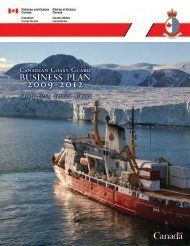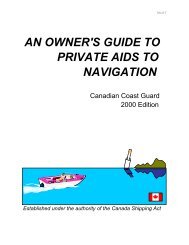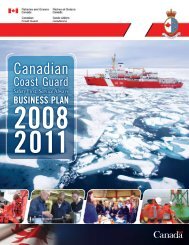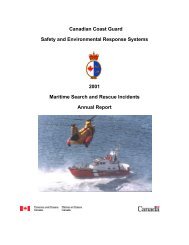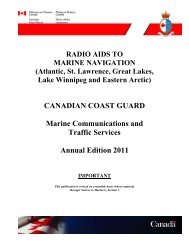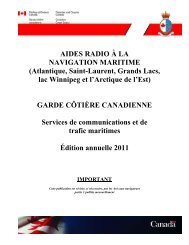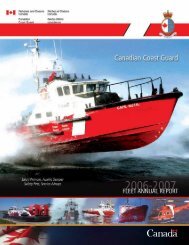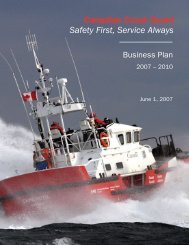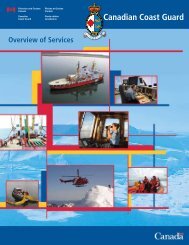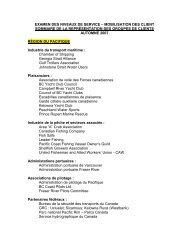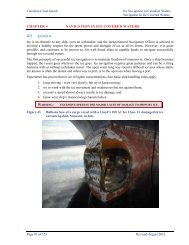PART 4 - Canadian Coast Guard
PART 4 - Canadian Coast Guard
PART 4 - Canadian Coast Guard
You also want an ePaper? Increase the reach of your titles
YUMPU automatically turns print PDFs into web optimized ePapers that Google loves.
Guidance for Masters in Distress Situations and Alerting of SAR Authorities<br />
In 1992, the International Maritime Organization (IMO) prepared a flow chart providing GMDSS operating guidance for<br />
masters of ships in distress situations (COM/Circ.108). It was recommended that this chart be displayed on the ship's<br />
bridge.<br />
Later, another circular (MSC/Circ.892) was prepared to strongly emphasize the importance for ships to alert SAR<br />
authorities at the earliest possible moment in any situation that may involve a danger to life or that has the potential of<br />
developing into such a situation.<br />
The following is for the mariner’s information and guidance:<br />
• GMDSS Operating Guidance for Masters of Ships in Distress Situations and;<br />
• Alerting the Search and Rescue Authorities<br />
GMDSS OPERATING GUIDANCE FOR MASTERS OF SHIPS IN DISTRESS SITUATIONS<br />
Colour<br />
red<br />
Is vessel<br />
sinking<br />
or to be<br />
abandoned<br />
?<br />
Yes<br />
Transmit, if time allows<br />
distress call by HF/MF/VHF<br />
DSC or INMARSAT<br />
Embark in survival<br />
craft with VHF, SART<br />
and if possible EPIRB<br />
Switch on EPIRB and<br />
SART immediately<br />
and leave on<br />
No<br />
No<br />
orange<br />
Is<br />
immediate<br />
help<br />
needed<br />
?<br />
Yes<br />
Transmit, distress<br />
call by HF/MF/VHF<br />
DSC or<br />
INMARSAT<br />
Response<br />
received<br />
?<br />
Yes<br />
Communicate on<br />
HF/MF/VHF or<br />
INMARSAT to<br />
JRCC<br />
and ships<br />
Switch on EPIRB<br />
and SART<br />
manually<br />
on board<br />
No<br />
No<br />
yellow<br />
A potential<br />
problem<br />
exists<br />
?<br />
Notify JRCC by<br />
HF/MF/VHF DSC<br />
or INMARSAT<br />
Response<br />
received<br />
?<br />
Yes<br />
Communicate on<br />
HF/MF/VHF or<br />
INMARSAT to JRCC<br />
and ships<br />
1. EPIRB should float-free and activate automatically<br />
if it cannot be taken into survival craft.<br />
2. Where necessary, ships should use any appropriate<br />
means to alert other ships.<br />
3. Nothing above is intended to preclude the use of any<br />
and all available means of distress alerting.<br />
RADIO DISTRESS COMMUNICATIONS<br />
Digital Selective Calling (DSC) Radiotelephone Radiotelex<br />
VHF Channel 70 Channel 16<br />
MF 2187.5 kHz 2182 kHz 2174.5 kHz<br />
HF4 4207.5 kHz 4125 kHz 4177.5 kHz<br />
HF6 6312 kHz 6215 kHz 6268 kHz<br />
HF8 8414.5 kHz 8291 kHz 8376.5 kHz<br />
HF12 12577 kHz 12290 kHz 12520 kHz<br />
HF16 16804.5 kHz 16420 kHz 16695 kHz<br />
4-18



